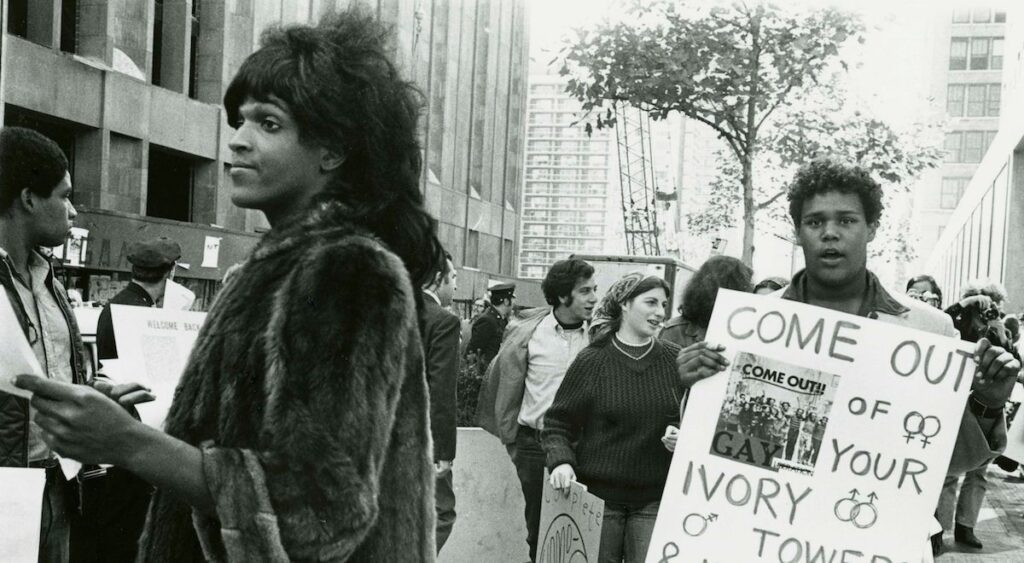
Next week, on Tuesday, April 24, members of the LGBTQIA community will come together to discuss their work on the Poor People’s Campaign: A National Call for Moral Revival through an online panel discussion. Among others, the discussion will feature Barbara Smith, New York State Coordinating Committee member and co-founder of the Combahee River Collective, Mandy Carter of the National Black Justice Coalition and activist in the original Poor People’s Campaign in 1968, and Aaron Scott, member of the National Steering Committee and Washington State Coordinating Committee and organizer at Chaplains on the Harbor. (For a full list of speakers, and to RSVP for the webinar, click here.)
Below, Aaron shares some of his thoughts on the role of queer and trans leaders in the Poor People’s Campaign: A National Call for Moral Revival, and how the Campaign relates to the history of queer and trans organizing from Stonewall to today.
The uprising against police violence that took place at New York City’s Stonewall Inn in June of 1969 is often considered to be the historic breakthrough moment for the LGBTQ movement in the United States.
The Stonewall uprising was also a poor people’s movement.
We have lost track of this in our collective, national memory.
Sylvia Rivera was poor. Marsha P. Johnson was poor. They lived in poverty, were subject to systemic racism, experienced the violence of our militarized society at the hands of police, and lived in poor neighborhoods historically subject to a range of ecological devastations.
The Poor People’s Campaign: A National Call for Moral Revival is indebted to the leadership of countless LGBTQ leaders for justice—particularly those queer and trans leaders who are directly impacted by poverty, systemic racism, the war economy, and ecological devastation.
[aesop_quote type=”block” background=”#31526f” text=”#ffffff” align=”left” size=”1″ quote=”The Stonewall uprising was also a poor people’s movement.” parallax=”off” direction=”left” revealfx=”off”]
In some ways, the movement for LGBTQ justice is a textbook example of how our organizing can become unmoored when we fail to hold ourselves accountable to those in our communities who are living under the greatest material deprivation. Historic victories have been won in marriage equality, military service, media representation and beyond. Tremendous labor and risk was poured into these fronts of struggle. Critical transformations have taken place.
Yet thousands and thousands of LGBTQ people in this country still face homelessness, a lack of access to necessary healthcare, police brutality, unemployment, underemployment, and so many more poverty-related issues.
Our movement, the Poor People’s Campaign: A National Call for Moral Revival, is here for queer and trans people directly impacted by these issues.
The Poor People’s Campaign is here for people living with HIV who cannot access medically necessary treatment for their survival due to their states’ refusal to expand Medicaid.
The Poor People’s Campaign is here for homeless queer and transgender youth forced into dangerous and exploitive situations because their counties refuse to adequately fund affordable housing and safe emergency shelters.
The Poor People’s Campaign is here for impoverished LGBTQ veterans who took a job at incalculable personal sacrifice only to return home to a nation woefully unprepared to help them heal from post-traumatic stress and moral injury.
The Poor People’s Campaign is here for undocumented queer people.
The Poor People’s Campaign is here for incarcerated Black trans women of color.
The Poor People’s Campaign is here for poor LGBTQ people from the projects to the trailer park and everywhere in-between.
[aesop_quote type=”block” background=”#31526f” text=”#ffffff” align=”left” size=”1″ quote=”The Poor People’s Campaign is here for poor LGBTQ people from the projects to the trailer park and everywhere in-between.” parallax=”off” direction=”left” revealfx=”off”]
We refuse to be a small movement. We refuse to be a tokenizing movement. At every level of leadership—from the National Steering Committee, to the statewide Coordinating Committees, to volunteer ushers and phone-bankers—this Campaign is lifting up the powerful leadership of our LGBTQ movement family while staying rooted in our analysis and practice of engaging masses of people of all genders, sexes, and orientations across all lines of division.
Talk of unity, so often, is wielded like a weapon against the marginalized: “Be quiet about your suffering—it is too strange and unappealing to everyone else.” This is a line most queer and transgender folks have heard too many times. But if we are calling for unity from the depths, from below on up, then we can and must and will face the specific pain and moral outrage of poor LGBTQ people.
We are here for all of us. Forward together, not one step back, not for any single one of our family in struggle.